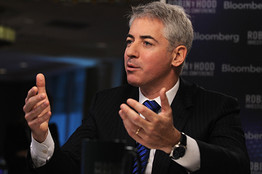|
THE WALL STREET
JOURNAL. |
Business
Activists Wept
for There Were No More Worlds to Conquer
The Activist
Investing Agenda—Buybacks and Cost Cuts—Has Become the Default
Boardroom Strategy
|
|
By
Dennis K. Berman |
 |
|
Updated
April 22, 2014 2:23 p.m. ET
"Shareholder value," once a guiding principle, has turned into a
brittle orthodoxy for CEOs and directors. Investor activists made this
so. By persistent menace and frequent success, their agenda—buybacks
and dividends, cost-cutting and tax gambits—has hardened into the
default boardroom agenda, too.
|

Most
activists have neither the capital nor the pull to complete a Bill
Ackman-like maneuver. Bloomberg News |
|
If
you closed your eyes, you might think this was
Carl Icahn squawking: "Our
priorities for 2014 are simple, and they're all targeted at increasing
shareholder value." But, no, this was an executive of car-parts maker
Delphi Automotive PLC just a
few days ago, using the now-standard activist argot on his own.
Activists today have some $100 billion under management, and won a
stunning 68% of the proxy contests they entered in 2013, up from 43%
in 2012. Today an activist is the chairman of
Hewlett-Packard Co.; has
squeezed onto the board of
Microsoft Corp., and has shaken
up once-impregnable redoubts such as
Dow Chemical Co.,
DuPont Co.,
PepsiCo Inc. and
Procter & Gamble Co.
This
intellectual and cultural takeover, decades in the making, would
appear to have reached its triumphant, final plateau.
That's precisely the problem.
Just
what does an activist do when investing and activist investing have
nearly become one in the same?
What's the value of an activist when most boards have already
internalized the activist credo, and in some cases have even accepted
an activist into their ranks?
The
answer is that the activism market, like any market, has begun to
adapt. And this is where things will get very interesting for the
future of business. Scarcity is forcing activists to become more than
value stockpickers, but exotic and operational nit-pickers on capital
structure, products, personnel and R&D costs. They're turning into
self-imposed management consultants.
All
of this could bring some fresh innovation into the way American
companies are run. It also raises the stakes for failure of both
activist and company alike.
"The
response by intelligent boards to focus inward and view themselves
through an activist perspective means it's much more difficult for an
activist to find targets," says David Katz, a partner at New York's
Wachtell, Lipton, Rosen & Katz, which has traditionally sided with
companies against activists.
The
exotic came into view on Monday afternoon, when Valent Pharmaceuticals
International Inc. announced a pre-emptive alliance with activist
William Ackman to coax
Allergan Inc. into a $40
billion-plus merger. By any measure this is unprecedented coupling: As
if Valeant has stationed Mr. Ackman as a nightclub bouncer outside its
fancy lawyer's office, where he can brandish his $4 billion, 10%
Allergan stake to keep Allergan in line.
Their arrangement is significant in that it eradicates the final
cultural separation between corporate and activist interests. Before,
companies would never dream of such alliances, viewing activists as
unseemly Wall Street pests with roots in the "greenmailing" days of
the 1980s. Today, neither their capital nor their influence can be
avoided.
The
stock market applauded the approach, pushing up both Valeant and
Allergan shares. Similarly, a highly-cited and controversial 2013
study by Harvard Law School's Lucian Bebchuk of 2,000 activist
situations found that operating performance at affected companies
actually improved over time.
The
reality is that most activists have neither the capital nor the pull
to complete an Ackman-like maneuver. They're still trying to persuade
and agitate against smaller prey.
Which gets us back to the question: Are there enough quality targets
to go around? Mr. Katz says no. He found, for instance, 200 activist
campaigns in 2013, compared with 27 in 2000. He counts some 100 hedge
funds in the market with some history of activism.
"There's a shakeout coming, because we've seen a number of activists
focus on smaller companies," says Mr. Katz. "You can't make money that
way."
If
anything, the future of activism might look something like what's
happening at
Darden Restaurants Inc., which
owns the Red Lobster and Olive Garden chains.
Here
two successful activists funds—Starboard Value and Barington Capital
Management—are competing to impose their fastidious visions of Darden.
As is almost standard now, Darden relented to demands that it spin off
Red Lobster.
But
that wasn't enough. There's been months of angry back-and-forth about
what should be in the spinout, and what Darden should do with its real
estate.
There's money, and some glory, to be had at the end of this campaign.
Watching the two activists bicker with management, one still wonders
just what their fuss is about. Their differences seem small, their
rhetoric increasingly shrill.
Is
there room for successful activist investing? Of course there is. But
it's hard not to expect that, having eradicated frictions in the way,
the activist approach is due for its own remake.
In
this game, no friction, no pleasure.
Write to Dennis K.
Berman at
dennis.berman@wsj.com and follow him on Twitter
@dkberman
|